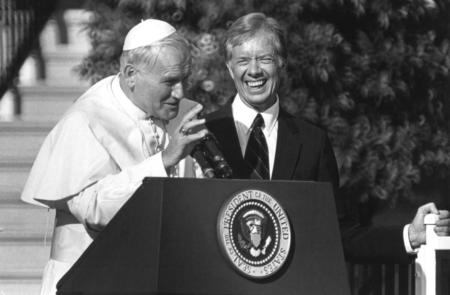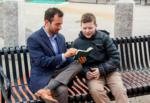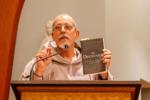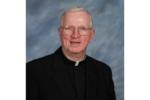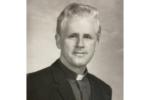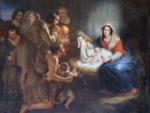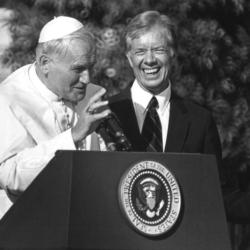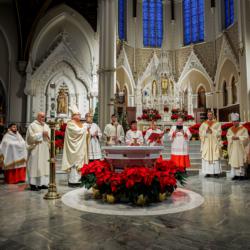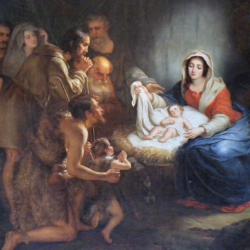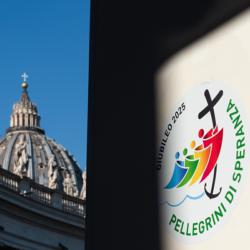Msgr. Paul B. McInerny granted senior priest status
Msgr. McInerny has fulfilled so many tasks for the archdiocese that there was no way to even mention them in the article's headline. As you will learn as you read on.
On March 27, 1946, he was born in Woburn, the sixth of the eight children of the late Stephen and Helen (Haggerty) McInerny. The family were parishioners at St. Charles Borromeo Parish, and he happily relates that under no circumstance would anyone miss Sunday Mass following the example of his parents.
He attended the parish grammar school under the watchful eyes of the Sisters of Notre Dame de Namur. For high school, he went to nearby Arlington Catholic, where he came to admire the Sisters of St. Joseph who were the faculty there. He is not shy about telling how much he admired those women religious.
He also points proudly to his home parish, which for several generations was a "hotbed" of vocations not just to the Sisters of Notre Dame, which would be obvious, but also to the priesthood of the archdiocese and multiple religious communities. The priesthood vocations relied on the series of outstanding parish priests who were assigned to the parish. At one point during his youth, Msgr. McInerny worked at the parish rectory answering phones and doors and so saw the life of a diocesan priest and was attracted to it. Naturally, the encouragement of his family planted the first seeds.
Following his graduation from "AC," he entered the archdiocesan seminaries, first at Cardinal O'Connell in Jamaica Plain and then for both philosophy and theology studies to the Brighton campus of St. John.
His first assignment was as an associate at St. Ann Parish, Wayland (1972-1977), and his second as an associate to St. Raphael Parish, Medford (1977-1981). A great narrator of stories, he has a storehouse of them from his parish assignments. Every once in a while tossed in will be "and I still visit" about people in one or the other of his previous assignments. Calling Paul gregarious is an understatement. He loves an audience and never disappoints.
In 1981, he was assigned to the staff of the Metropolitan Tribunal and lived in residence at St. Anthony of Padua Rectory, Allston, until 1983. He was sent to study canon law at the Catholic University of America, receiving a licentiate degree (JCL) in 1986. He returned and served briefly again at the Tribunal.
In 1986, Bernard Cardinal law named him executive secretary of the recently summoned Eighth Synod of the Archdiocese of Boston.
The synod had been announced a couple years previously by Archbishop Law at his installation as archbishop.
Father McInerny was responsible for synodal meetings, large and small, for consultations with literally the entire archdiocese. Input was sought at listening sessions from parishioners, priests in various ministries, women and men religious, lay leadership at parish and diocesan offices, the clergy, religious and lay staff of the chancery offices and agencies. It was a process to contact and involve every level, sphere, and ministry.
The synod ended with Cardinal Law's promulgation of the synodal statutes as well as a series of guidelines for ministries and liturgy.
In 1991, Cardinal Law appointed Father McInerny as his secretary and master of ceremonies. He was quite simply Cardinal Law's right hand. Certainly respecting the canonical offices, e.g. vicar general and auxiliary bishops, but being constantly with the archbishop meant he was both at the archbishop's constant disposal but also at his side.
Already well familiar with the archdiocese, especially from his experience with the synod, he now got to see it even more closely. Principally, the job of master of ceremonies is the most visible. Preparing the liturgies which the cardinal would celebrate, whether at the cathedral, in a parish, or in a prison, required a deft hand and mind. Attention to the details of the liturgy is important, but all the more so when the liturgy is that of the diocesan bishop, which is to serve as the model for all the liturgies of a diocese. The bishop sets the tone, the MC orchestrates it. When they are in "sync," then any liturgy is a worthy praise of God and a sure model for a diocese.
Paul always conveyed a seriousness about the liturgy and was very much "by the book." He always appreciated arriving at a parish with "the boss" and having everything ready to go. One always had the suspicion that he knew exactly where he could expect that and where he might need to arrive earlier to bring things up to "the boss's expectations."
During his service to the cardinal, and at the cardinal's request, Father McInerny was named a member of the papal household by Pope St. John Paul II as a prelate of honor with the title of Reverend Monsignor.
Lest the reader think this meant that there was only that side to him, there was another. And you could not help but like it. In addition to his seemingly bottomless store of personal tales, he had an entire repertoire of jokes, humorous narratives of clerical foibles, and puns. I recall once being with him and probably a dozen other priests. Cardinal Law was at one end of the table in "deep conversation" with the priests near him. Others were at the opposite with Paul holding court. Once on a roll, he almost couldn't stop and when the audience was in uproarious laughter, the cardinal "ahemed" and said "Msgr. McInerny would you like to share with the rest of the table?" Without missing a beat he took up the challenge, but changed the whole direction of the conversation.
After 10 years at "The Residence," the cardinal named him director of Boston Catholic Television in 2001. Succeeding the late Msgr. Francis McFarland who had died suddenly, leaving a void in the "Parish of the Airways," for the next four years, he was pastor of that vast parish. His ease with people made the transition a bit easier on the parishioners. In 2005, Archbishop O'Malley appointed Father (now Bishop) Robert Reed to succeed Msgr. McInerny.
In the meantime, Pope Benedict XVI had named Cardinal Law to be the Archpriest of the Papal Basilica of St. Mary Major in Rome. Msgr. McInerny then moved to Rome to assist the cardinal in that new position. While there, he also taught canon law to the students of the "Beda," a seminary of the British Catholic Church in the Eternal City.
As you can now see, it would have been very difficult to compact into a few words Msgr. McInerny's priestly ministry.
Probably something has been forgotten or overlooked, but before concluding, I have to mention cigars. He is an aficionado of them. And they serve as great prop for his "narratives."
Msgr. McInerny returned to the archdiocese from the Eternal City last fall and was granted senior priest retirement status. He is now residing at Regina Cleri in Boston's West End. In good weather, you can walk by and perhaps catch him with an audience of senior priests and cigar smoke wafting about the group.
